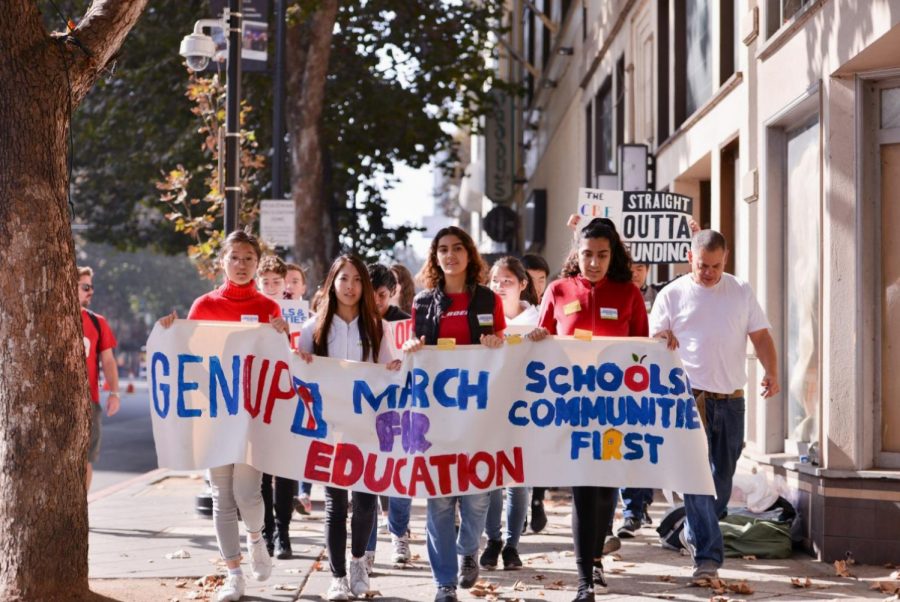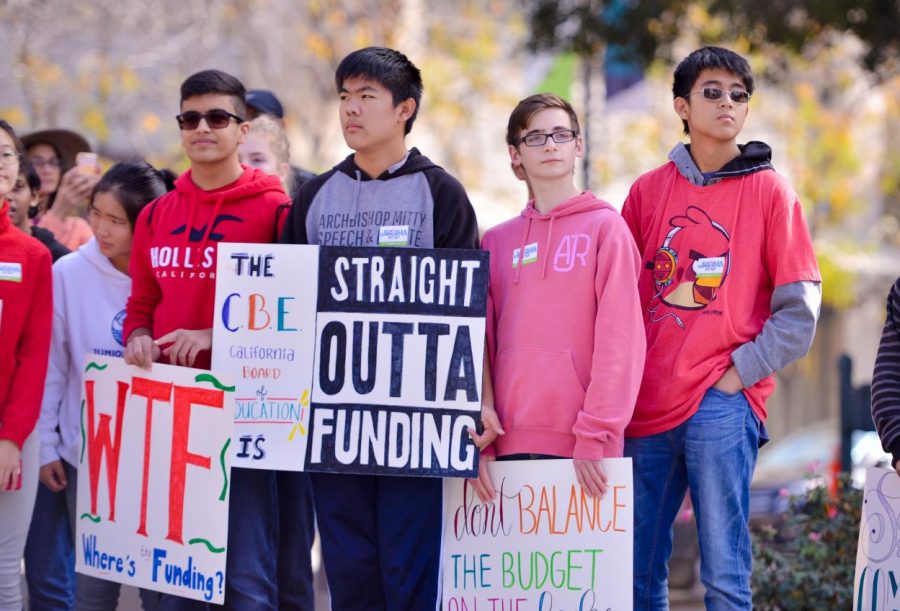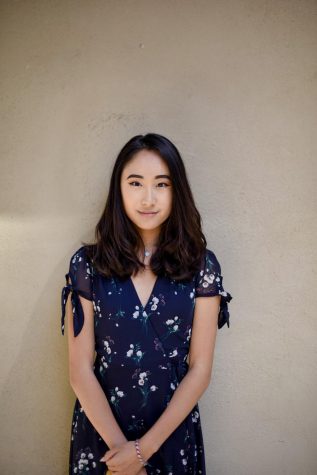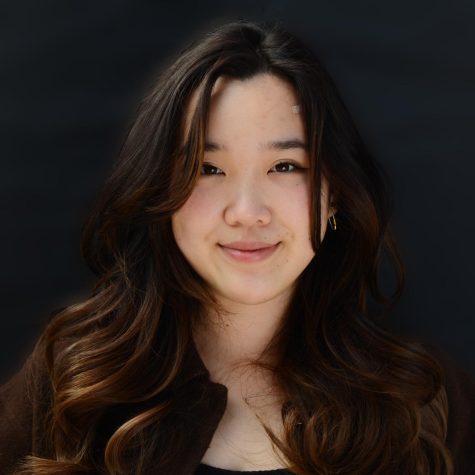“Students, teachers take a stand”: March for Education rallies support for educational funding
Saanvi Arora (10) joins other high school students from around the Bay Area in leading last Saturday’s March for Education. Saanvi is a member of GEN-Up, a student-led social justice organization and student-activist coalition.
November 19, 2019
Over 100 people gathered in César Chavez Plaza in downtown San Jose on Nov. 9 as part of the March for Education, an event hosted by GEN-Up, a student-led social justice organization and student-activist coalition. The event featured talks from student speakers and elected officials, as well as a rally followed by a march to San Jose City Hall where students demanded action from local and state leaders in support of the “Schools and Communities First” Act.
Marchers followed GEN-Up’s student initiators around San Jose downtown towards City Hall. Sophomores Cady Chen and Saanvi Arora are both members of GEN-Up who introduced other speakers and organized the event. Saanvi, along with her fellow GEN-Up members, led the march, holding up a wide hand-painted sign reading GEN-Up, March for Education and Schools and Communities First.
“There’s no reason our public education system should be the way it is now. The teachers have low wages, [and] so many don’t have an incentive or reason to care about their students that much. There’s failing infrastructure [in public schools], and they don’t have mental or physical health resources,” Cady said. “Honestly, everyone deserves an equal education. It’s everyone’s future and the basis for all other social issues. It’s all very intersectional.”
The march primarily focused on strengthening the educational system, improving school infrastructure, ensuring a high quality of education, and providing a living wage for teachers. Protestors called for the reformation of Proposition 13, a corporate tax which froze property tax at the 1976 level, allowing companies like Disney to pay property taxes at the rate of 5 cents per square foot.
In its place, protestors advocated for the adoption of the “Schools and Communities First” Act in November 2020, a piece of legislation that would close tax loopholes and reclaim approximately 12 billion dollars per year for K-12 public schools, community colleges and local communities. The act would require all property to be assessed at proper market value while maintaining protections for small businesses, homeowners, and renters.
In keeping with a trend in recent marches such as the climate march in September, the entire event was student-run. A coalition of high school and college-level student activists involving students from around the area involved with various nonprofits and advocacy groups led the effort, inviting students, teachers and activists to fight for better educational funding. Rallies were held in San Jose, San Francisco and Oakland.
To support the march and its speakers, attendees wore red and held printed signs that read “Schools and Communities First.” The morning began with speeches by various students and community leaders, including state assemblyman Ash Kalra and high school students from around the Bay Area.
April Sun (10), spoke about her experience as a high school student and her yearn to change the future along with her peers, referring to the public education system as a”network of broken facilities that can’t even ensure the safety of their children, much less provide proper guidance and support.”
“An education allows people to receive opportunity, not only the ability to gain a higher social position and social equality but also the ability to create a path to one’s dreams. It makes students views of the world more open and helps young people to develop their ideas about life,” she said in her speech. “For me, my experiences at school have helped me outline a manner in which to pursue my dreams and they have defined what I value and my outlooks in my daily life.
Upper school computer science teacher Susan King attended the march with her husband, inspired by the Harker students who were involved in its organization. King has previously taught in public schools and has experienced the limits of funding and its effects on students firsthand.
“I really believe in education. I really believe in funding for public education, because I believe education is the foundation for a good democracy, and a powerful democracy that represents all the people. ” King said. “Teaching in a public school is a wonderful experience because it’s being with kids. However, you do see the influence of a lack of funding. In large classrooms, it’s much harder to get the information across as you would be able to in small classrooms.”
Young children, current teachers and students and retired educators alike attended the march, all uniting to rally behind the power of education.
“The march is pertinent to grades K through 12, so we thought that a lot of things that we would be proposing at the march would be related to people at Harker too. Even though we go to a private school, a lot of things that we are proposing overlap, so want to bring awareness to people at Harker about the state of the outside public education system,” Saanvi said.


















![“[Building nerf blasters] became this outlet of creativity for me that hasn't been matched by anything else. The process [of] making a build complete to your desire is such a painstakingly difficult process, but I've had to learn from [the skills needed from] soldering to proper painting. There's so many different options for everything, if you think about it, it exists. The best part is [that] if it doesn't exist, you can build it yourself," Ishaan Parate said.](https://harkeraquila.com/wp-content/uploads/2022/08/DSC_8149-900x604.jpg)




![“When I came into high school, I was ready to be a follower. But DECA was a game changer for me. It helped me overcome my fear of public speaking, and it's played such a major role in who I've become today. To be able to successfully lead a chapter of 150 students, an officer team and be one of the upperclassmen I once really admired is something I'm [really] proud of,” Anvitha Tummala ('21) said.](https://harkeraquila.com/wp-content/uploads/2021/07/Screen-Shot-2021-07-25-at-9.50.05-AM-900x594.png)







![“I think getting up in the morning and having a sense of purpose [is exciting]. I think without a certain amount of drive, life is kind of obsolete and mundane, and I think having that every single day is what makes each day unique and kind of makes life exciting,” Neymika Jain (12) said.](https://harkeraquila.com/wp-content/uploads/2017/06/Screen-Shot-2017-06-03-at-4.54.16-PM.png)








![“My slogan is ‘slow feet, don’t eat, and I’m hungry.’ You need to run fast to get where you are–you aren't going to get those championships if you aren't fast,” Angel Cervantes (12) said. “I want to do well in school on my tests and in track and win championships for my team. I live by that, [and] I can do that anywhere: in the classroom or on the field.”](https://harkeraquila.com/wp-content/uploads/2018/06/DSC5146-900x601.jpg)
![“[Volleyball has] taught me how to fall correctly, and another thing it taught is that you don’t have to be the best at something to be good at it. If you just hit the ball in a smart way, then it still scores points and you’re good at it. You could be a background player and still make a much bigger impact on the team than you would think,” Anya Gert (’20) said.](https://harkeraquila.com/wp-content/uploads/2020/06/AnnaGert_JinTuan_HoHPhotoEdited-600x900.jpeg)

![“I'm not nearly there yet, but [my confidence has] definitely been getting better since I was pretty shy and timid coming into Harker my freshman year. I know that there's a lot of people that are really confident in what they do, and I really admire them. Everyone's so driven and that has really pushed me to kind of try to find my own place in high school and be more confident,” Alyssa Huang (’20) said.](https://harkeraquila.com/wp-content/uploads/2020/06/AlyssaHuang_EmilyChen_HoHPhoto-900x749.jpeg)









